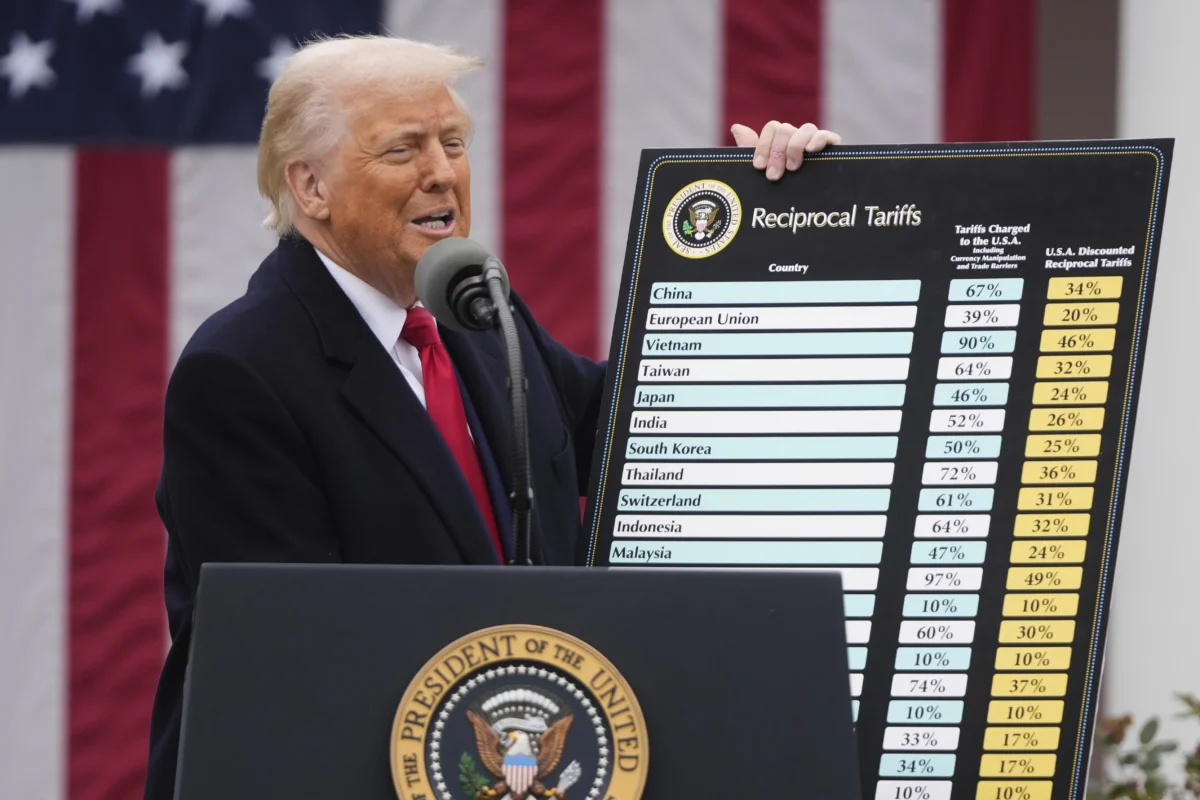President Donald Trump declared on Wednesday a 10 percent baseline tax on imports from all countries and higher tariff rates on dozens of nations that run trade surpluses with the United States.
Trump held up a chart while speaking at the White House, showing the United States would charge a 34 percent tax on imports from China, a 20 percent tax on imports from the European Union, 25 percent on South Korea, 24 percent on Japan, and 32 percent on Taiwan.
Trump declared a national economic emergency to launch the tariffs, expected to produce hundreds of billions in annual revenues. He has promised that factory jobs will return back to the United States as a result of the taxes, but his policies risk a sudden economic slowdown as consumers and businesses could face sharp price hikes on autos, clothes, and other goods.
“Taxpayers have been ripped off for more than 50 years,” Trump said in remarks at the White House. “But it is not going to happen anymore.”

Trump was fulfilling a key campaign promise as he imposed what he called “reciprocal” tariffs on trade partners, acting without Congress through the 1977 International Emergency Powers Act in an extraordinary attempt to both break and ultimately reshape America’s trading relationship with the world.
The president’s higher rates would hit foreign entities that sell more goods to the United States than they buy, meaning the tariffs could stay in place for some time as the administration expects other nations to lower their tariffs and other barriers to trade that it says have led to a $1.2 trillion trade imbalance last year.
The tariffs follow similar recent announcements of 25 percent taxes on auto imports; levies against China, Canada, and Mexico; and expanded trade penalties on steel and aluminum. Trump has also imposed tariffs on countries that import oil from Venezuela and he plans separate import taxes on pharmaceutical drugs, lumber, copper, and computer chips.
Based on the possibility of broad tariffs that have been floated by some White House aides, most outside analyses by banks and think tanks see an economy tarnished by higher prices and stagnating growth.
Rep. Suzan DelBene (D-Wash.) said the tariffs are “part of the chaos and dysfunction” being generated across the Trump administration. The chair of the Democratic Congressional Campaign Committee stressed that Trump should not have the sole authority to raise taxes as he intends without getting lawmakers’ approval, saying that Republicans so far have been “blindly loyal.”
“The president shouldn’t be able to do that,” DelBene said. “This is a massive tax increase on American families, and it’s without a vote in Congress … President Trump promised on the campaign trail that he would lower costs on day one. Now he says he doesn’t care if prices go up—he’s broken his promise.”
Even Republicans who trust Trump’s instincts have acknowledged that the tariffs could disrupt an economy with an otherwise healthy 4.1 percent unemployment rate.
“We’ll see how it all develops,” said House Speaker Mike Johnson (R-La). “It may be rocky in the beginning. But I think that this will make sense for Americans and help all Americans.”
Longtime trading partners are preparing their own countermeasures. Canada has imposed some in response to the 25 percent tariffs that Trump tied to the trafficking of fentanyl. The European Union, in response to the steel and aluminum tariffs, put taxes on 26 billion euros’ worth ($28 billion) of U.S. goods, including on bourbon, which prompted Trump to threaten a 200 percent tariff on European alcohol.
The flip side is that Americans also have the incomes to choose to buy designer gowns by French fashion houses and autos from German manufacturers, whereas World Bank data show the EU has lower incomes per capita than the U.S.
“Europe has not started this confrontation,” said European Commission President Ursula von der Leyen. “We do not necessarily want to retaliate but, if it is necessary, we have a strong plan to retaliate and we will use it.”
Italy’s premier, Giorgia Meloni, on Wednesday reiterated her call to avoid an EU–U.S. trade war, saying it would harm both sides and would have “heavy” consequences for her country’s economy.


